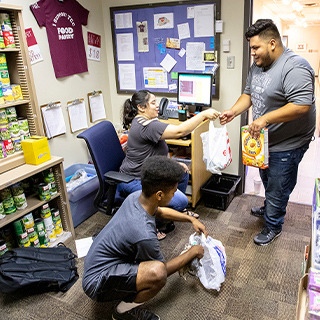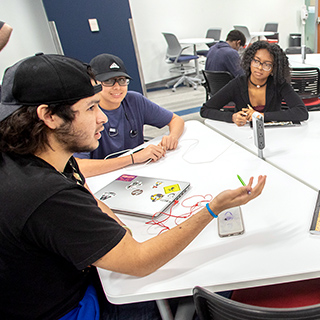Tackling Student Poverty
New Resources Are Available to Help Students in Need
Emergency car repairs. A utility shut-off. Child care costs. Eviction.
These are examples of everyday expenses and unexpected circumstances that can derail a college student’s progression toward a degree or certificate.
Community colleges typically enroll a higher proportion of low-income students than four-year schools, and Tarrant County College is no exception. To help students achieve their academic and professional dreams, all six TCC campuses provide a wealth of resources to help students reach the finish line.
 Identifying and implementing resources that are designed to increase student success
outcomes and maximizing organizational efficiencies is the responsibility of the Integrated
Student Success Model (ISSM) team at TCC. ISSM is one of the eight principles by which
TCC employees approach their work every day.
Identifying and implementing resources that are designed to increase student success
outcomes and maximizing organizational efficiencies is the responsibility of the Integrated
Student Success Model (ISSM) team at TCC. ISSM is one of the eight principles by which
TCC employees approach their work every day.
The team’s review of the data made it clear that many students were struggling financially and in need of some help. A 2018 Trellis survey of TCC students revealed their fragile lives and propensity to be in financial distress. More than half of respondents (61 percent) indicated they would have trouble getting $500 in cash or credit in case of an emergency. Walking this kind of financial tightrope threatens a student’s ability to stay in school and persist toward graduation. TCC leaders wanted to deepen the College’s work of supporting the basic needs of its students.
As a result, TCC Chancellor Eugene Giovannini challenged the TCC Foundation to raise money that would help “eliminate barriers that stand in the way of student success.” The TCC Foundation answered the challenge, raising $150,000 to help launch its Emergency Fund in October 2019 through which cash-strapped students can apply for micro-grants of up to $500 to manage urgent, unforeseen and non-recurring emergencies. Students on the brink of leaving school due to financial emergencies are guided to their campus’ CARE team to initiate the Emergency Fund process.
To be eligible for the emergency grant, students must be enrolled in a minimum of six credit hours with a 2.0 cumulative GPA. Students will be asked to complete an application and provide supporting documentation, such as bills or invoices.
 During the fall 2019 semester, TCC received 100 requests for assistance, with 45 being
awarded. Some of the factors that impacted the rejections were incomplete paperwork
submissions, GPA, minimum number of credit hours weren’t taken, students withdrew
the application or their application didn’t meet the program’s definition of “emergency.”
During the fall 2019 semester, TCC received 100 requests for assistance, with 45 being
awarded. Some of the factors that impacted the rejections were incomplete paperwork
submissions, GPA, minimum number of credit hours weren’t taken, students withdrew
the application or their application didn’t meet the program’s definition of “emergency.”
By providing this support service to students, TCC is hoping to see an improvement in retention and persistence numbers.
For college student-parents, finding affordable and quality child care before it interferes with their ability to pursue an education is critical. Rising child-care costs are forcing many college student-parents to make tough decisions that could include dropping out altogether. Thanks to a four-year, nearly $1.5 million Child Care Access Means Parents in School (CCAMPIS) grant from the U.S.
Department of Education, TCC will pilot a child-care assistance program for Pell Grant-eligible student-parents beginning this summer.
TCC’s new child-care assistance program will partner with Child Care Management Services (CCMS) to defray child-care costs for low-income students. Funds from the CCAMPIS grant will subsidize costs for student’s children to attend a Texas Rising Star (TRS) Four-Star certified child care center. Participants in the program will be relieved of 20 to 75 percent of the financial burden of child-care costs, representing a critical step TCC is taking to remove economic obstacles to student persistence and graduation.
In addition to receiving child-care assistance subsidies, recipients will be required to participate in family enrichment sessions designed to connect student-parents with resources designed to support their academic journey.
For 55 years, TCC has been committed to helping students achieve academic success that leads to graduation and subsequently, meaningful employment that uplifts not only families, but our regional economy as well.
Peter Jordan, President of TCC South and champion of the ISSM Principle
“Over the next four years, we believe the child-care assistance pilot program will prove beneficial in removing an important barrier to our student-parent participants’ academic attainment while also yielding important data we can use to scale the program with community partners. Ultimately, our vision is to provide on-campus child care for a significantly larger student-parent population.”
Child-care costs in the Tarrant County area range from approximately $193 per week for preschoolers at a small facility to $357 for higher-end, center-based care. Not only is the TCC Child Care Assistance Program a lifeline for some TCC student-parents, but it should show prospective students that TCC is committed to helping all students reach their academic dreams.
 “This assistance is not only crucial but necessary to help students with children
succeed,” said Maritza Ramirez, a new mother currently taking two classes at TCC Northwest.
“To eliminate the stress of knowing who can take care of your child is a great deal
because we then can be more attentive to our academics.”
“This assistance is not only crucial but necessary to help students with children
succeed,” said Maritza Ramirez, a new mother currently taking two classes at TCC Northwest.
“To eliminate the stress of knowing who can take care of your child is a great deal
because we then can be more attentive to our academics.”
TCC collected and analyzed various forms of data to ensure the design and implementation of the pilot program would generate solid results. Survey data revealed that nearly half of the students surveyed could not afford child care and had to rely on family, friends and other to watch their children while they worked and attended classes.
Currently, only students pursuing an associate degree or certificate linked to an associate degree are eligible for the TCC Child Care Assistance Program. Students enrolled in day, evening, weekend or online classes are eligible for child- care assistance.
Interested student-parents will be required to complete an online application with documentation to prove eligibility for participation. Although the application states “first come, first served,” student-parents who are military-connected, homeless or teens will receive priority. All other applications will be reviewed in order of their submission.
To qualify for the program, students should have successfully completed at least nine credit hours, be Pell Grant-eligible, enrolled in at least nine credit hours in an academic or technical program at TCC and maintain a 2.0 cumulative GPA. To remain in good standing, recipients also must participate in a minimum of three family enrichment sessions per academic year to get connected to resources that will increase their chances of personal and academic success.
“The CCAMPIS grant project includes an enrollment specialist and a program coordinator that will provide personalized support for students as they enroll and participate in the program,” said Anthony Walker, assistant director of academic initiatives at TCC. “There will be additional resources made available through other institutional resources to supplement the TCC Child Care Assistance Program.”
The goal is to serve 125 student-parents annually. Walker said that TCC will use data and outcomes from the initial project to help inform decision-making as the College works to expand capacity and sustainability to increase the number of supports for student-parents.
In recent years, TCC has implemented several initiatives designed to remove barriers for students, including a partnership with Trinity Metro to provide free bus and rail rides to students, on-campus food pantries and a partnership with an area food market to provide fresh produce to the surrounding community.


![//parameter[@name='author']](/magazine/assets/images/authors/reggie-lewis.jpg)